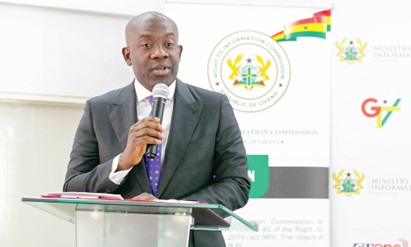
Public raise concerns over RTI payments
Information seekers have expressed worry over fees they have to pay to enable them to access crucial information under the Right to Information (RTI) Law in the country.
Some individuals are being asked to pay about GH¢2,000 as part of processes to retrieve the needed information, although others identified as part of the “poor class”, or Persons with Disabilities (PWDs) are exempted.
This has left some citizens expressing their displeasure on the accessibility challenges and inequalities faced under the implementation of the Rights to Information Act, 2019 (Act 989).
The individuals voiced their concerns at a public forum held in Accra yesterday to mark the third anniversary of the passage of the RTI law.
The RTI Act passed in 2019 was to give substance to the constitutional right of information of citizens by enabling them to access information held by government institutions.
However, the forum was aimed at bringing together stakeholders to discuss the progress, challenges and findings based on research to generate solutions that would ensure the effective implementation of the act three years on.
Implementation
The Minister of Information, Kojo Oppong Nkrumah, described the three years of the implementation of the RTI law as largely successful even though it had experienced some challenges.
![]()
The participants
He indicated that the act had established about 500 information units with over 350 officers deployed across most institutions in the country.
That, the Information Minister said, had ensured that over 1,000 requests being put in had been adequately served.
“The Act is not what gave the right to information, but the constitution gave the right to information; thus, we are working tirelessly to ensure that the mandate is achieved,” Mr Oppong Nkrumah emphasised.
Challenges
The Minister of Information, however, stated that the delay in the passage of the regulations had slowed processes as it would operationalise the Act.
Mr Oppong Nkrumah expressed the hope that Parliament would pass the regulation in its next sitting.
The minister also highlighted an institutional challenge characterised by a culture of secrecy among most institutions which is rooted in the fear of potential embarrassment.
He said that posed difficulties for the institutions to share information openly.
Additionally, poor public record-keeping and the inability to move on to digital platforms impeded the implementation of the bill.
Way forward
The minister, however, underscored the need to intensify public education on the law to ensure that its demand sector was adequately improved.
That, he said, would help enhance citizen engagement and understanding of their rights under the bill to actively put it to use.
Mr Oppong Nkrumah added that the ministry was looking into investing in digital or online platforms where individuals could easily request information and process it at their own comfort.
